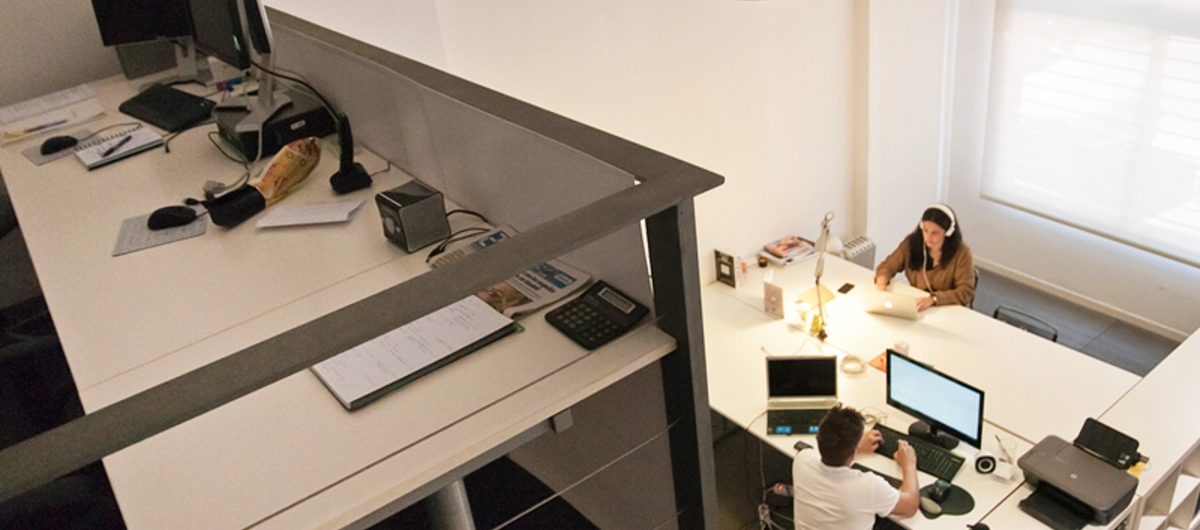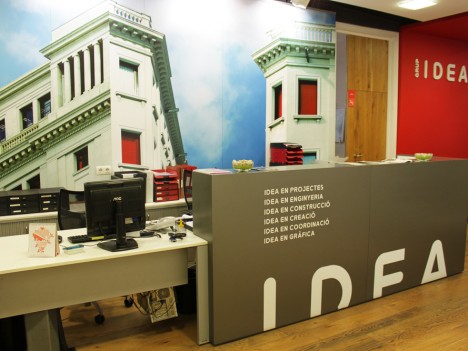The average Spanish coworking space is small and intimate with fewer than 20 desks, and run by a coworking space operator who (very) recently incorporated the values of coworking into what was originally a shared office. More commonly in Spain than elsewhere, coworking spaces evolved from the transformation of private creative studios, and still run in tandem with the founder's own business. Some of these have expansion plans, following the sucess of the coworking element of their business.
Certainly, this profile could describe a coworking space anywhere in the world. But what sets Spain apart is that these firms are more often architectural studios, an industry devastated by the crisis.
'Building' spaces
Times are dire for architects in Spain. The construction bubble that began to expand in early 2000 popped a couple of years ago, signalling a 70% drop in construction nationwide. In Barcelona alone more than 50% of architectural firms have been forced to close.
“Part of this condition stems from the fact that Spanish architectural students are qualified to sign large projects immediately following graduation, without doing an interim,” explained Edgar Gonzalez, architect professor and author of his self-titled design blog. “For this reason, there is a much higher number of boutique architectural firms with less than ten staff members, compared to other countries.” Meaning many more companies that are potentially affected by the crisis.
In fact, when the construction industry - once so prosperous - became crippled, 20% of these hundreds of boutique firms needed a supplementary business. “Architects require lots of space, large desks and an open work environment,” said Edgar. Office sharing was for many a natural, and suitable, option.
Some of these spaces - along with interior design and multimedia studios - then moved beyond the shared office concept and adopted the coworking ethos. In Spain, these new coworking spaces are the final iteration of a shared office, having grown into their roles as collaborative and community-focused workspaces. There are many successful spaces that are considered pinnacles of the coworking world, which originally stemmed from something quite different.
Spanish architectural industry is therefore an important force in the coworking movement, and is an important point to consider when discussing the growth, direction and potential of the Spanish coworking scene.
Pop Culture
The explosion of coworking space numbers has made the word ‘coworking’ very popular (enough to warrant a Coworking Spain Conference), but also ultra fashionable.
The movement’s popularity has sparked the emergence of scores of business centers and private offices offering ‘desk rental’ and branding it ‘coworking’. This is worrying some coworking advocates in Spain, who feel that the emergence of faux-coworking will taint the image of the real movement.
Whether coworking spaces are threatened by these counterfeits remains a moot point. During the Coworking Spain Conference this month, opinions from opposite ends of the spectrum were presented.
“I don’t think it’s a problem (that shared offices are incorrectly calling themselves coworking spaces). Real coworking is growing each month... and creative freelancers are choosing coworking spaces over the other spaces.”, said Cristina Martínez-Sandoval from Gracia Work Center in Barcelona.
There will always be a difference in opinion, but numbers point to one side. Deskmag statistics from the 2nd Global Coworking Survey show that coworking space operators have nothing to fear from business centers.
Indeed, the simple fact that coworking is en vogue proves just how much gusto the movement in Spain has. Harnessing this gusto and deflecting it to other, smaller, Spanish cities is the real challenge for the coworking community.
Tradition
“We are coworking evangelists! Seville is a very traditional city. It’s difficult to make people understand why they should work together, to make them realize that collaboration is a good thing.” - Jaime Aranda, workINcompany, Seville.
The other challenge facing the Spanish community is in contrast to the popularity of coworking: Spaniards are wary of collaboration in the professional realm. The Spanish culture is a deeply traditional one. Although perhaps to a lesser extent in Madrid and Barcelona, inhabitants of even some of the biggest cities cling to traditional work values. While Spaniards are social, engaging, and communal, the fear of idea-theft prevails in a work environment.
The biggest challenge confronting current or hopeful coworking space operators, then, is how to spark a cultural shift, and to drive home the importance of the way an idea is executed, and not just the idea itself. Nonetheless, speaking to the hundreds of coworking enthusiasts in Spain is knowing they are off to a good start.
:: Ad ::
To find and book coworking spaces in Spain, visit Deskwanted.













